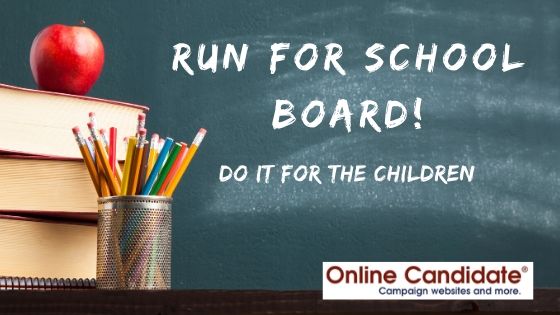
Every school district in the United States has a board of education. There are over 14,000 public school districts, with more than $500 billion spent on public elementary and secondary education each year.
That’s a lot of money that local control. How and where that money is spent is a powerful incentive for citizens to become involved in the process.
Often a parent will make the decision to run to become a member. They set the policies of our elementary, middle, and high schools. Their existence is based on the idea that local control of public education it more responsive to the needs of the local community.
A board of education acts as a public watchdog, setting direction and goals for the district, and to help ensure that those goals are kept on track.
They also deal with other important issues. These include finance and bond issues, class sizes, student curriculum, safety measures, teacher issues and more.

A board’s primary responsibilities vary from district to district, but generally include:
- Sets the vision and goals for the district
- Adopts policies and setting priorities to achieve its goals
- Sets student performance standards
- Establishes school budgets
- Approves the school calendar
- Adopts curriculum
- Evaluates and/or hires the superintendent
- Selects transportation systems
- Approves contracts with outside vendors
- Manage collective bargaining for district employees
The board balances the business of actually running the district while establishing and monitoring its’ academic priorities. An election can help bring important issues to focus. It is one of the most important local elections where voters have direct influence over policy.
Why run for a board of education position?
With all that responsibility, why would someone want to run for school board? It’s a tough and often thankless job.
Maybe there’s something you want to change. Perhaps there is an issue that is having an impact on the academic success of students in your district. One way to learn about what is going on locally is to attend board of education meetings and do your research.
Your goals will help you develop your platform. You should have a clear vision for what you want to achieve. You will be working with others in the community, so you’ll need to be able to work and collaborate with a variety of people.
Are you someone who can do that?
If you have a solid reason to run, you will have a better chance to win.
Did you know? Members for boards of education comprise the largest number elected officials in the United States.

Getting Your School Board Campaign Started
Becoming a board of education member does not require that you have background in education or teaching. In fact, you don’t need to have children, or children that are educated in the district.
There are certain requirements you must meet. Generally, you must be:
- At least 18 or 21 years old
- A resident of both the state and the school district.
- A non-felon
- That you or any relatives are not employed by the district.
- Most states also require that you be registered voter and otherwise eligible to be elected to public office.
Other local laws may apply, so you should check with your county election commission or district superintendent.
For most districts, members serve staggered, four-year terms. Elections may occur throughout the year, depending on local election law. You should know your filing and financial disclosure dates. You don’t want to become derailed because of technical requirements.
Of course, starting a campaign and seeing it through costs money. Research how much previous races cost through financial disclosure data that is publicly available. Most candidates cannot afford to pay for an entire campaign themselves. You’ll need a budget and a fundraising effort.
You’ll also need volunteers and plan to get your message out to the public. Your friends and family can be a big help. They can provide input and act as members of your campaign team. You will need a campaign manager, a treasurer, and press secretary. A candidate should NOT serve in any of these positions.
Volunteers are also important to help with advertising, fundraising efforts and getting the word out to voters. A volunteer coordinator helps recruit others and keeps them on task.
If your election happens to fall on a day other than general Election Day in November, motivating and turning out the vote is critical to the success of your campaign.
Reaching voters
Creating a website and using social media are important ways that candidates reach out and communicate with the electorate. Encourage a two-way dialog and ask others to share your information.
Traditional advertising techniques, such as yard signs, posters and newspaper letter writing campaigns still work well. However in recent years, digital advertising has become a more popular political advertising medium.
Consider reaching out through:
- Social media advertising. You can target people by location, age and other demographic data.
- Starting an email list will allow you to keep in touch throughout the campaign. It is less expensive than direct mail, too.
- Text messaging and SMS services.
- Pay Per Click ads to reach people searching for you or your issues.
- IP Targeting to reach physical household addresses digitally.
The election process can be complicated. Everyone has a different mix of resources and abilities. The key is to create and execute a plan to win the election.
Related articles and resources:
